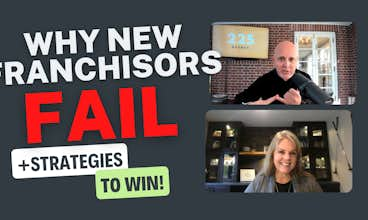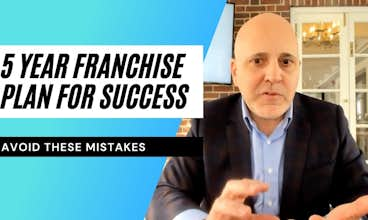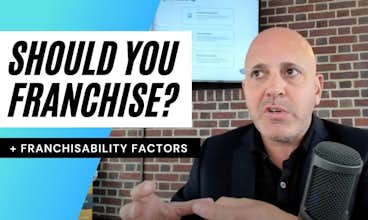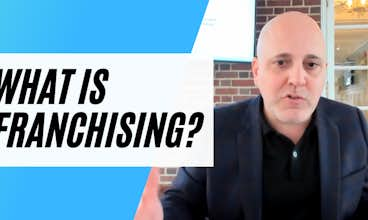The Go-Giver co-author Bob Burg's five laws for business success
Charles N. Internicola sat down with Bob Burg, co-author of The Go-Giver about business success - plus strategies to create a culture of excellence in any franchise.
In the ever-evolving world of business, success can sometimes feel as elusive for those who are just getting started as it can for those with years of experience in their industry.
But is there a way to raise the odds of success as an entrepreneur, despite all the uncertainty? Some business experts believe there is. According to Bob Burg, co-author of The Go-Giver, there are five “laws” for doing business that can put entrepreneurs – including franchisors – on the path to success from Day One.
From creating value to touching lives, connecting with your authentic core, establishing a culture of excellence and more, the “Go-Giver Way” lays out a simple but effective foundation for entrepreneurial success in any industry – including franchising.
The Internicola Law Firm sat down with Burg to discuss his principles for success – and the simple strategies every franchisor can use to establish a culture of excellence in their franchise system.
1. Create Value
When it comes to entrepreneurship, making sure a brand offers a high level of value – especially compared to the competition – is critical.
“Nobody's going to do business with you (just) because you have a quota. … They're not going to do business with you because you would like the sale to happen. And they're not going to do business with you just because you're a nice human being. They're going to do business with you because they believe that, ultimately, they will be better off by doing so than by not doing so – which means they find more value in the proposition than not,” Burg says.
According to Burg, adding value to a business can mean anything from improving the products sold to the way the brand interacts with its customers, or even the way you interact as a business owner with partners and vendors. As an entrepreneur in a competitive market, creating value simply means ensuring that everyone – in every transaction – walks away in a better position than they started.
“The Law of Value, where we say your true worth is determined by how much more you get in value than you take in payment – that doesn't mean you're losing money. No, it means you're both winning. So, the franchisor and the franchisee are both winning because both are coming away better off afterward than they were beforehand,” Burg says.
When it comes to franchising, the Law of Value can also mean making sure franchisees can identify the value of investing their time, money and effort in a franchise brand – a strategy experts say can make a big difference for franchisors.
“When we're working with franchisors, we're talking about delivering value for franchisees and those franchise sales – for us, it's always focused on what are the unit-level economics, what's the ROI potential we're giving them, and what's the culture that our organization offers? Something that I've learned is when you think you're delivering great value, there’s always room for more,” says Charles N. Internicola, a franchise attorney with over 25 years of experience and founder of The Internicola Law Firm.
2. Touch Lives and Serve Others
Although providing excellent value is critical for business success, it isn’t enough to stop there. The income your brand generates will be determined not only by the value you provide but also the number of lives your business touches and how many people it serves.
“The more people whose lives we touch with the exceptional value we provide, the more money with which will be rewarded,” Burg says.
For franchisors whose goal is to touch as many lives as possible, having strong, replicable systems in place to scale their brand is critical.
“(Franchisors) need to achieve scalability, client-base broadcasting. And what's interesting is when you do that, I find you deliver more value because you distribute further and you increase that pool of people that benefit and you're helping,” Internicola says.
Still, franchisors should be cautious about believing that the systems they develop to scale their brands are a solution on their own. Instead, Burg advises franchisors to remember that human interaction – and the difference you make in others’ lives through your brand’s presence – is where the real value is.
“Too often I think we, as human beings, will get caught up when there's a really good system that works by thinking the system is the end, where it really isn't. It's the means to the end. And this is where people skills come in,” Burg says.
3. Build Networks and Positively Influence Others
No business is an island – and franchise systems are no exception. Because of that, building strong networks and exerting a positive influence in your industry is important. For entrepreneurs, that often means placing the interests of others – from customers to franchisees – ahead of your own.
“All things being equal, people will do business with, refer business to, and allow themselves to be led and influenced by those people they know, like and trust. And there's no faster, more powerful or more effective way to elicit those feelings toward you in others than by genuinely moving from that ‘I’ focus or ‘me’ focus to that ‘other’ focus,” Burg says.
Still, Burg cautions that putting the needs of others first in business shouldn’t mean sacrificing the best interests of your business. Instead, entrepreneurs should seek a balance between their interests and those of others.
“Make your win all about the other person's win,” Burg advises.
In the franchise industry, putting the needs of others first can also bring other benefits – including value creation.
“Putting the interests of others first forces you, as a (franchise) team, to focus on your products, your services, your systems – which then gets to your value. And all these things just reinforce themselves,” Internicola explains.
4. Be Authentic
When it comes to business, authenticity is often the best device for success in any entrepreneur’s toolbox.
“The most valuable gift you have to offer is yourself. … Sales skills, technical skills, people skills, as important as they are – and they are all very, very important – they're also all for naught if you don't come at it from your true authentic core,” Burg says.
However, being authentic doesn’t necessarily mean doing or saying whatever you want without boundaries just for the sake of being authentic to your whims. Instead, Burg says true authenticity, as it relates to business, is about consistency and making sure your actions align with your values.
“It is difficult to sustain trust when you're not consistent because, as human beings – and this, of course, goes back to our cave-person ancestors – when consistency was a matter of survival, you had to know what was what, where it was, where who was, and it had to be consistent,” Burg explains.
By knowing your values and sticking to them consistently over time, franchisors can build trust in relationships with customers, clients and business partners.
“When you do when you show up as yourself day after day, week after week, month after month. People feel good about you. They feel comfortable with you. They feel safe with you,” Burg says.
5. Stay Open to Receiving
Beyond offering excellent value to others and remaining consistent in your approach to business, Burg advises entrepreneurs to stay open to receiving – something that can make it easier to give to others over time.
“The key to effective giving is to stay open to receiving,” Burg says, acknowledging that his fifth law of success might appear “paradoxical” to some.
Although it may seem easy, Burg says staying open to abundance can be challenging for entrepreneurs in a world where wealth is often associated with negative messaging about wealth-building.
Instead of listening to “anti-prosperity messaging” – for example, ideas that money is inherently bad or that acquiring wealth requires you to do bad things – Burg advises entrepreneurs to instead focus on consistently providing excellent value to customers from their authentic core, as well as giving and receiving in good measure.
“Giving and receiving are not opposite concepts, despite what the world around us tries to tell us. Giving and receiving are simply two sides of the very same coin. And they work in tandem,” Burg says.
Establishing a Culture of Excellence
When it comes to achieving success, following the “Go-Giver Way” often requires entrepreneurs to establish a culture of excellence within their business – something that can help any brand thrive over time.
“There are so many ways to be excellent. It's the mastery of your art, mastery of your craft. It's always understanding that you need to keep getting better. It's how you make others feel during every touch point, whether it's your employees, whether it's your franchisees and whether it's their customers,” Burg says.
For franchisors, instilling a culture of learning can also be beneficial. By encouraging everyone in the franchise system, from leadership down to hourly employees, to make suggestions about better or more efficient ways to run the business, franchisors can ensure their systems are serving everyone their business touches in better ways – and providing excellent value to everyone that interacts with their brand.
While not every idea or suggestion will be a good one, Burg says making sure franchisees, employees and customers feel heard, seen and valued can contribute to a culture of excellence – and make the entire organization better as a result.
“As (others) feel good about themselves, they'll feel good about the company that they're doing business with. And I think that is the culture that's got to be at the forefront. And it can't be a sometimes thing – it has to absolutely be immersed. It has to be part of the DNA,” Burg says.
To learn more about Bob Burg and The Go-Giver Way, visit https://thegogiver.com.









